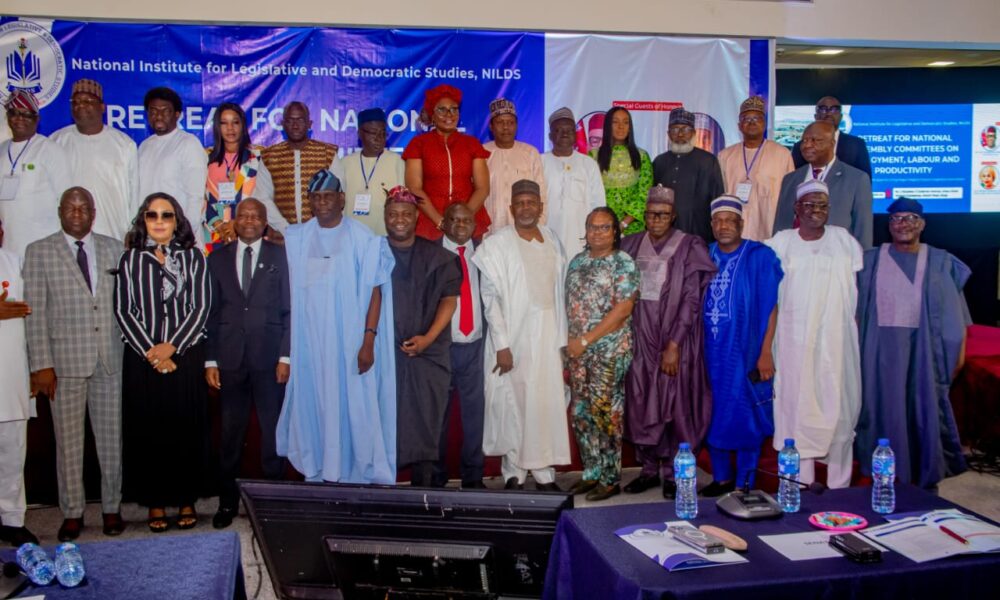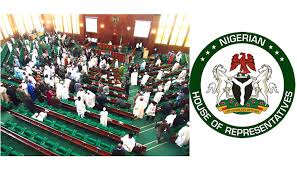***Says actual value of N1b Govt contract is less than N400m
***Akpabio promises quick passage of National minimum wage
The former Head of Service of the Federation, now Chairman Tripartite committee on National Minimum Wage, Alhaji Bukar Aji Goni has listed conditions for Nigerian Government to be able to pay living wage to civil servants.
Speaking in a goodwill message at a retreat on Labour Reform and the Quest for Living Wage in Nigeria: A focus on Legislative Intervention, organised by National Institute For Legislative Studies (NILDS) on Monday, he said fundamentaly the Federal Government must reduce cost of governance.
“We must reduce our profit margins on Government contracts. In every N1b contract awarded the actual value delivered may not be more than N400m. No economy can sustain this whether China or US. We must critically look at that point.
“The next is one area that has become topical these days, the issue of procurement of SUVs by government agencies, we also need to critically look at that based on the present economic realities.
“The replacement period of government vehicles of four years must change to between 8 to 10 years. If a Prado is procured for a Director General in a government agency that Prado must serve 8 to 10 years no longer 4 years because the economy can no longer sustain it.
“The next is the issue of borrowing, when we must borrow at the Federal or at the subnational levels, it must be towards development of a critical infrastructure that is directed towards production and growth of the GDP.

“Is living wage possible in Nigeria? The answer is yes. We can move the country towards paying a minimum wage but certain developments have to happen for us to be able to afford minimum wage, there are some conditions attached to it.
“We need time for the gestation and fruition of some of the Economic programs of the administration. Every ambition that you have every plan that you must start from somewhere of the target.
“And some of the Economic policies that are harsh as at now, the feeling is tough but they are towards the repositioning of the economy and this is one of the critical factors. When we allow them to materialise, it will be one of the reasons that the country could afford a living wage.
“The second is the review of the National manpower development policy of this country. We need to rebuild the National Manpower Developmwnt towards having graduates from our tertiary institutions that are employable and that will contribute to the productive. “We must emphasize production and that is the only way to reposition the economy to be able to afford a national minimum wage.
“The third is the overall improvement in the economy, in this case reforms in the oil and Gas sector that will enable the country to meet with the OPEC quota of between 1.8m barrels per day to 2m barrel per day. As it is today we are at 1.2m bpd.
“What do we do to be able to meet up with the OPEC quota? That should improved infrastructure and that will include not only providing the required security at the Niger Delta to stop oil theft but it will also include huge investments in revamping and addressing the decayed oil and gas infrastructure”
“The act establishing salaries and wages Commission has a provision that each time there is inflation bites that agency is empowered under what they term as collateral cost of living allowances adjustment, that is annual.
“Every year if inflation goes up the agency is empowered by law to adjust cost of living allowance. This can provide a succor to be able to manage the situation.
“Now the second terminology, is living wage. Living wage has a much more complicated calculation. It is expected to be a wage that is expected to be paid to a worker far above the Marginal existence.
“This could include his health care needs and that of his family, his transportation, education of the family and after all that he should be able to have something to save for a rainy day.”
Alhaji Goni said, as chairman of the Tripartite committee which was made up of 37 members, including him, at one of the meetings, they all agreed on the need to increase the minimum wage of workers but however, the committee could not reach a conclusion on how much was needed to be increased minimum wage.
“At a time it is so convoluted that as someone who is midwiving different interests each interest that opens its mouth will convince you that day that you have no other option than to adopt its own position.
“The two forces in the whole exercise is that of desirability and affordability. Every one in the room comprising 36 members, 12 from Labour, 12 from the Private sector, 12 from the Government side, 36 of them, myself as an umpire as a neutral person, 37. “All the 37 agreed that there was need and desire to increase the National minimum wage but what extent, how far can it go became so difficult to understand.
“O the side of Labour the issue definitely is that of cost of living on as at today, on the side of Government, the position of the National economy and inflation, on the side of the private sector, cost of electricity, cost of diesel, customs duties particularly for manufacturers.”
He therefore advised the Federal government to reduce the cost of governance in order to save more money for national productivity, using appropriate reforms.
The Minister of state for Labour and Employment, Dr Nkeiruka Onyejeocha called on stakeholders to treat workers with dignity, stressing on the safety of workers in their work places, by creating an enabling environment for operation.
The president of the Senate, Senator Godswill Akpabio assured the participants on the speedy passage of the bill on Minimum Wage if sent to the National Assembly.
Senator Godswill Akpabio who was represented at the One day Retreat by senate committee Chairman on Employment, Labour and Productivity, Diket Plang, Plateau Central said National Assembly is passionate about issues relating to Nigeria workers and ready to stand side by side with the Nigerian workers.
Earlier, in his welcome address, the Director General National Institute for Legislative and Democratic Studies, NILDS professor Abubakar Sulaiman said the personalities attending the retreat signified how important the event is, which was aimed at embarking on labour reforms in order to provide a good work force in the country.
Professor Sulaiman said that no Nation survives in a chaotic situation, hence the need for realistic living wage for Nigeria workers.
He disclosed that since National Assembly is the only arm to deliberate on such issues , the retreat was paramount for them to provide insights for quality debate.
Similarly, the National president Trade Union Congress TUC Comrade Festus Osifo said Nigerians were passing through tough times, thereby making life extremely difficult for a Nigerian worker.
Comrade Osifo said to negotiate for Minimum Wage was necessary because of high inflation in the country.
The Director General Nigerian Employers’ Consultative Association NECA, Mr Adewale Smatt Oyerinde, said the Programme was necessary and pledged to support the labour reforms.
The lead paper was presented by the President National Industrial Court of Nigeria, Justice Benedict Kanyip who titled the paper: Labour laws, Issues and challenges and the way forward.
The retreat was formerly declared open by the Senate president.




